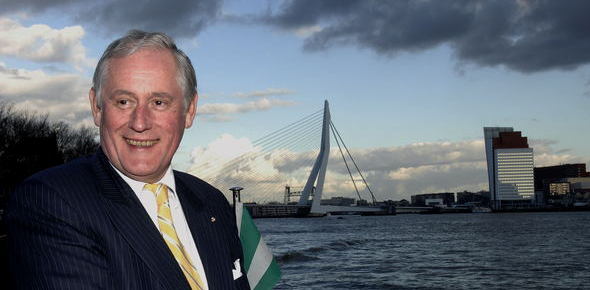The sequel to the boys’ book of Atlanta 1996- Hans Nieukerke
August 6, 2012
The challenges of writing a new chapter
Volleyball is the biggest indoor sport in the Netherlands. With 125,000 members, we are one of the biggest sports associations in the country. Beach volleyball is also becoming increasingly popular, with the number of beach venues rising fast. With so many (beach) volleyball players in a small country like the Netherlands, you’d think that an association like ours would find it easy to optimally facilitate our national teams. And yet, an association which seems to have all the organisational resources it needs – a fulltime programme, a solid talent development line, high quality technical staff and plenty of experience in organising major sports events – is unable to handle the consequences of what is a fantastic sporting success.
In July our relatively young men’s team, led by a new and ambitious coach, took us all by surprise by winning the European League. A brilliant result, which entitles the team to take part in the qualification for the World League. This is the most prestigious tournament in the world of volleyball with great commercial potential and the springboard for the Olympic games. Participation in the World League involves many obligations and thus huge costs for an association. In budgetary terms, our association had not planned for this victory, let alone the fact that we would have to host both qualification rounds. In sporting terms fantastic, but in financial terms: a massive challenge!
In that respect, Dutch volleyball is unfortunately trapped in a vicious circle that we are keen to break through. Following a spate of disappointing results in the past, media attention for volleyball among national broadcasters and the daily press has declined. This is unheard of in countries like Poland, Italy and Turkey, where volleyball is big and as such is widely embraced as an important sport for society. Events are usually sold out, broadcast live on national television and the teams – national heroes – followed by the press. In these countries, it is therefore easier to generate funding for the sport or an event; in fact events usually make a profit.
For us as an association, the costs of organising an event are substantial, also in view of the obligations imposed at international level. Most of the costs are related to TV production. Unfortunately we do not currently have a big media partner to reduce or share these costs and to ensure national coverage on TV. Sadly our sport is not considered important enough for recordings of our games to be broadcast on national television. In concrete terms, this means that, as an association with no form of support, we are unable to organise major international events. This despite the fact that in our country 600,000 people regularly play volleyball and that there are 1.2 million fans.
From the above, it is clear that it is hard for us to find a partner for a team or the association. Unfortunately, business investors put great stock on media attention. This not only applies to us, but also to our 1100 volleyball member clubs. The position of volleyball on the agenda of media partners and sponsors and present results mean that a professional volleyball player cannot earn a living in the Netherlands. This is why we are seeing top players leaving for foreign clubs at an increasingly young age. For the Dutch top clubs and national competition, this constitutes a huge challenge. As long as talented players trained by us leave the country for relatively low sums of money, the national competition will probably never be able to compete at European level. The common denominator in countries where volleyball does well is that national competition is strong and the players do not leave the country.
The focus of the policy of the NOC*NSF, the umbrella organisation for sports in the Netherlands, from 2013 is on top ratings at World Championships and the Olympic games. As a team sport, this is a challenge; on the one hand we are rated on the basis of past results, while on the other hand, unlike individual sports, we only get one opportunity every two years to perform. For volleyball, being judged on short-term results is at odds with building a top team that can last several years. If you choose to bring in fresh blood, as we did last year, it’s nearly impossible to fulfil the demands in 2013 which focus on becoming one of the ten best sporting countries in the world.
To summarise, it is a huge challenge for us to offer a good fulltime programme to our national teams and to ensure that they can play in important competitions. Without NOC*NSF support and with no partners or sponsors, this is impossible. However we are trying hard in various areas to add that new chapter to the boys’ book of Ron Zwerver, Peter Blangé and Joop Alberda, among others.
About Hans Nieukerke
Until 1 July 2007, Nieukerke was director of the Hoenderloo Group, an organisation which provides youth care and education. Nieukerke became a national name in 1999 when he founded the Glen Mills School, a ‘re-education school’ for young offenders.
Besides his youth work, Nieukerke was also chairman of the employers’ association for welfare, youth care and child welfare, board member of MKB Nederland (SME Netherlands) and deputy councillor of the Social Economic Council (SER).
Nieukerke is currently president of the Netherlands Volleyball Association, the Federation for International Nature Conservation (FIN), the NUSO (Dutch union for playground associations) and chairman of the SHV (umbrella organisation for people with congenital brain injury).
Finally, Nieukerke has been and is still involved in various capacities in the VVD (conservative party).
[photography (c) Ronald Hoogendoorn]
{jcomments on}

